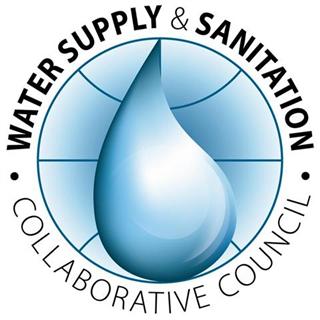Difference between revisions of "Water Supply and Sanitation Collaborative Council WSSCC"
(New page: Image: {{Orgbox | name = WSSCC| logo = Logo WSSCC.JPG| location = Geneva, Switzerland | orgtype = NGO | class = Network | keywork = solution implementation, <br /> gender approaches, <br ...) |
|||
| Line 8: | Line 8: | ||
class = Network | | class = Network | | ||
keywork = solution implementation, <br /> gender approaches, <br />decentralization,<br /> transfer of knowledge| | keywork = solution implementation, <br /> gender approaches, <br />decentralization,<br /> transfer of knowledge| | ||
| − | website = [http://www. | + | website = [http://www.wsscc.org www.wsscc.org] |
}} | }} | ||
| − | + | The Water Supply and Sanitation Collaborative Council (WSSCC) is a global multi-stakeholder partnership organisation that works to improve the lives of poor people. WSSCC enhances collaboration among sector agencies and professionals around sanitation and water supply and contributes to the broader goals of poverty eradication, health and environmental improvement, gender equality and long-term social and economic development. The activities undertaken by WSSCC were recognized in the United Nations General Assembly resolution A/RES/45/181 of 21 December 1990. WSSCC is hosted by the World Health Organization (WHO). WSSCC has a network of national WASH Coalitions in 36 countries and individual members in nearly 100 countries. WSSCC works through three programmes: Networking & Knowledge Management, Advocacy & Communications and the Global Sanitation Fund. WSSCC ’s mission is to achieve sustainable water supply and sanitation for all people. | |
| − | + | Through Networking and Knowledge Management, WSSCC provides a neutral space in which individuals and organisations concerned with water, sanitation and hygiene for poor people in developing countries can network and share ideas. | |
| − | + | Through Advocacy and Communications, WSSCC promotes global and national advocacy efforts by members and partners to raise awareness of the humiliating and harmful social environment of the unserved poor, especially women and children, and to facilitate lasting change by urging | |
| − | + | placement of water supply, adequate sanitation and hygiene firmly on the political agenda. | |
| + | |||
| + | Through the Global Sanitation Fund, WSSCC supports national efforts to help larger numbers of poor people to attain sustainable access to basic sanitation and to adopt good hygiene practices. | ||
| Line 29: | Line 31: | ||
== External links == | == External links == | ||
| − | [http://www. | + | [http://www.wsscc.org WSSCC website] |
Revision as of 19:31, 10 June 2009
Image:
| WSSCC | |

| |
| Location: | Geneva, Switzerland |
| Type: | NGO |
| Class: | Network |
| Key work: | solution implementation, gender approaches, decentralization, transfer of knowledge |
| Website: www.wsscc.org | |
The Water Supply and Sanitation Collaborative Council (WSSCC) is a global multi-stakeholder partnership organisation that works to improve the lives of poor people. WSSCC enhances collaboration among sector agencies and professionals around sanitation and water supply and contributes to the broader goals of poverty eradication, health and environmental improvement, gender equality and long-term social and economic development. The activities undertaken by WSSCC were recognized in the United Nations General Assembly resolution A/RES/45/181 of 21 December 1990. WSSCC is hosted by the World Health Organization (WHO). WSSCC has a network of national WASH Coalitions in 36 countries and individual members in nearly 100 countries. WSSCC works through three programmes: Networking & Knowledge Management, Advocacy & Communications and the Global Sanitation Fund. WSSCC ’s mission is to achieve sustainable water supply and sanitation for all people.
Through Networking and Knowledge Management, WSSCC provides a neutral space in which individuals and organisations concerned with water, sanitation and hygiene for poor people in developing countries can network and share ideas.
Through Advocacy and Communications, WSSCC promotes global and national advocacy efforts by members and partners to raise awareness of the humiliating and harmful social environment of the unserved poor, especially women and children, and to facilitate lasting change by urging placement of water supply, adequate sanitation and hygiene firmly on the political agenda.
Through the Global Sanitation Fund, WSSCC supports national efforts to help larger numbers of poor people to attain sustainable access to basic sanitation and to adopt good hygiene practices.
Main activities
- Capacity building and Awareness-Raising
- Advocacy and Policy Recommendations
- Implementing Solutions, Demonstrating Alternatives
- Increasing balanced participation of women and men in policy making and implementation
